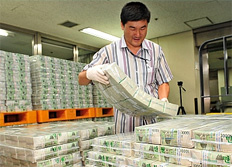 영어토론방 영어토론방 | Home>영어토론방 |
Education Tuition Hikes Pit Students Against Schools
페이지 정보

본문
 Korean universities and colleges are now charging on average one of the highest tuition fees among the 30 OECD countries, leaving students and parents with the burden of paying up to almost 10 million won annually.
Korean universities and colleges are now charging on average one of the highest tuition fees among the 30 OECD countries, leaving students and parents with the burden of paying up to almost 10 million won annually. A 2009 OECD Report placed Korea second after the United States on the list of the top 10 countries in average tuition fees. It is more expensive to study at Korean universities than those in Japan, Australia, Canada and New Zealand. But is Korean college education really worth the costs involved?
The latest surveys indicate that the tuition hikes are not proportional with the level of education provided by Korean universities.
An OCED report rated Korea 51st among 57 countries in its index of university competitiveness.
While universities in Hong Kong, Singapore and Japan placed highly in the Quacquarelli Symonds (QS) World University Rankings published last year, no Korean university managed to make it into the top 40.
The logic of some policymakers and universities to justify the necessity of the tuition hikes is that an increased budget is required to secure a more advanced education curricula, teaching staff and facilities for students, particularly in their race for recognition in the international academic arena.
Around 75 percent of local colleges and universities’ budgets come from tuition costs, far higher than the OECD average of 25 percent.
“It would be great if the fees were low. But if tuition is too cheap, then it could bring down the quality of education,” President Lee Myung-bak said during a visit to the Korea Student Aid Foundation Tuesday.
However, many students are skeptical that the two affect one another and student associations are demanding a freeze.
Universities have been bashed for being insensitive to the inconsistency in the level of tuition and quality of education.
“Considering the level of education from Korean universities, the tuition is extremely low. There is no country in the world that charges such low tuition costs,” said Korea University President Lee Ki-su, who heads the Korean Council for University Education. Korea University (KU) is one of the most expensive private schools in the country.
The remarks came at a time when students and parents are becoming increasingly frustrated, particularly after many colleges recently announced another increase.
On Jan. 28, Yonsei University announced a 2.5 percent increase, leading other universities like Sogang, Soongshil, Hannam and Hongik to follow suit.
Hankuk University of Foreign Studies, Hangyang University and Sungshin Women’s University, among many others in and around Seoul, are also likely to raise their tuitions.
A network of civic groups held a press conference Tuesday to protest KU President Lee Ki-su’s remarks and moves from many private universities like Yonsei University in Seoul to pursue higher tuition costs.
“It is irresponsible for the leader of a university, who also heads the Korean Council for University Education, to make such remarks at a time of extreme hardship faced by students and parents in the age of 10-million-won tuition,” protesters said in a statement.
The latest surveys have underlined the harsh reality faced by college students.
A Job Korea survey showed that more than 70 percent of graduating college seniors are in debt, owing an average of 11.3 million won.
University and college tuition here has more than doubled over the past 10 years, according to a recent survey.
Excerpt from The Korea Times
Source: http://www.koreatimes.co.kr/www/news/nation/2010/02/117_60309.html
Question
1. How did you pay your university tuition fees? (e.g. parents, scholarship, student loan etc.)
2. President Lee said that if tuition is too cheap, then it could bring down the quality of education.
What do you think about tuition hikes for high quality of education?
(지원아 What 부터 education까지 밑줄좀그어줘요~)
3. What can be some methods to prevent tuition hikes? Talk about your opinion.
이 글은「대학연합영어토론동아리」www.pioneerclub.com에서 제공하는 영어토론 정보입니다.
댓글목록

프리지드님의 댓글
프리지드 작성일Universities in Korea should take actions to improve the quality of lectures and faculties rather than raise their tuition fee.

